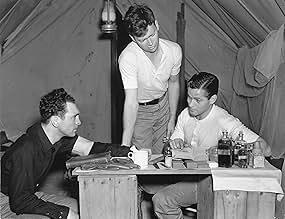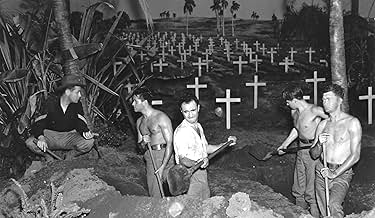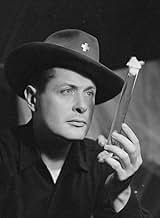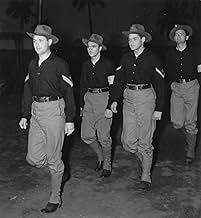In the fever-stricken areas of Cuba, a brave band of scientists, doctors, and U.S. Marines fight a losing battle against the deadly plague of 'Yellow Jack' until the great heroic risk taken ... Read allIn the fever-stricken areas of Cuba, a brave band of scientists, doctors, and U.S. Marines fight a losing battle against the deadly plague of 'Yellow Jack' until the great heroic risk taken by an Irish sergeant brings victory.In the fever-stricken areas of Cuba, a brave band of scientists, doctors, and U.S. Marines fight a losing battle against the deadly plague of 'Yellow Jack' until the great heroic risk taken by an Irish sergeant brings victory.
- Awards
- 2 wins total
William Arnold
- Officer
- (uncredited)
Joseph E. Bernard
- Carpenter - Soldier
- (uncredited)
Roger Converse
- Lieutenant
- (uncredited)
Featured reviews
This film begins in Cuba at the end of the Spanish-American War with the victorious American army now facing an even more deadly foe-yellow fever. And the concern is even more heightened due to the fact that nobody knows what causes it or how it is spread. So fearful that the returning soldiers may bring this deadly disease back to the United States the army sends a team of highly respected doctors led by a man named "Major Walter Reed" (Lewis Stone) to look for answers. Unfortunately, after a full year in Cuba he is forced to admit to the commander of the area that he is no closer to finding the cause or the cure than he was the day he arrived. Then one day he is apprised of some research conducted by a local doctor named "Carlos Finlay" (Charles Coburn) who had proposed a cause for the disease almost 19 years previously but was derided for it. Now rather than reveal any more I will just say that this was a decent drama which contained elements of suspense and romance within the plot as well. And even though it was clearly dated, I still found it to be somewhat enjoyable and for that reason I have rated it accordingly. Slightly above average.
YELLOW JACK is not the enthralling film it should have been about a subject like finding the cure for YELLOW JACK (or malaria), and too much of the early set-up for the story is so talky that right away you can almost see the wheels turning slowly in Sidney Howard's stage play.
But once it gets down to the experimenting, it becomes more interesting to watch. Then again, there are plenty of flaws in the material. One is the insistence on using ANDY DEVINE as comic relief throughout. He makes such a buffoon of the squeaky-voiced dimwit, that his character becomes nothing more than a cartoon. Adding to the unreality, is the appearance of cool blonde VIRGINIA BRUCE as a hard-working nurse in Cuba, looking as fresh as a cucumber no matter how unbearable the heat or how trying the situations are. She looks perfectly groomed in every loving close-up and her acting is, as usual, bland.
ROBERT MONTGOMERY's brogue seems to have annoyed many viewers here, but he does an okay job with the accent. Only question is, why did he have to be portrayed as an Irishman in the first place? And furthermore, why given the name of John O'Hara, when we already had a famous writer by the same name known to the public? Montgomery sounds much like the character he played in NIGHT MUST FALL, but at least his performance here is far better and more convincing than Miss Bruce's work.
Other cast members are competent enough, but little screen time is given to CHARLES COBURN in a minor role as a cynical doctor. Those that make the biggest impression are ALAN CURTIS (handsome man was leading man material and deserved better than this kind of supporting role), SAM LEVENE, HENRY HULL (although a bit overwrought), and in a very brief role as one of the first victims, PHILIP TERRY.
Interesting mainly for the cast and the unusual aspects of the story, but definitely a film that needed to be made more cinematic rather than stagebound with too much talk during the first half-hour.
But once it gets down to the experimenting, it becomes more interesting to watch. Then again, there are plenty of flaws in the material. One is the insistence on using ANDY DEVINE as comic relief throughout. He makes such a buffoon of the squeaky-voiced dimwit, that his character becomes nothing more than a cartoon. Adding to the unreality, is the appearance of cool blonde VIRGINIA BRUCE as a hard-working nurse in Cuba, looking as fresh as a cucumber no matter how unbearable the heat or how trying the situations are. She looks perfectly groomed in every loving close-up and her acting is, as usual, bland.
ROBERT MONTGOMERY's brogue seems to have annoyed many viewers here, but he does an okay job with the accent. Only question is, why did he have to be portrayed as an Irishman in the first place? And furthermore, why given the name of John O'Hara, when we already had a famous writer by the same name known to the public? Montgomery sounds much like the character he played in NIGHT MUST FALL, but at least his performance here is far better and more convincing than Miss Bruce's work.
Other cast members are competent enough, but little screen time is given to CHARLES COBURN in a minor role as a cynical doctor. Those that make the biggest impression are ALAN CURTIS (handsome man was leading man material and deserved better than this kind of supporting role), SAM LEVENE, HENRY HULL (although a bit overwrought), and in a very brief role as one of the first victims, PHILIP TERRY.
Interesting mainly for the cast and the unusual aspects of the story, but definitely a film that needed to be made more cinematic rather than stagebound with too much talk during the first half-hour.
'Yellow Jack' is a goodish, proficiently made Hollywood drama which is weakened by several poor artistic decisions, and rendered absolutely ludicrous by one especially bad decision (which I'll describe presently). The film deals with an inspiring true story in medical history, namely the attempts of the U.S. Army Medical Corps to find a cure for malaria, also known as yellow fever and 'yellow jack'. This disease, spread by mosquitos, was so virulent in tropical regions that it seriously hampered the efforts to build the Panama Canal, as well as similar endeavours in Cuba and elsewhere. I'm only slightly familiar with the facts of this story, so I can't say how accurate this movie is. However, some of the actors in this cast are playing actual historic figures ... notably the underrated Jonathan Hale as Major-General Leonard Wood, the officer in charge of the U.S. Army Yellow Fever Commission. Also excellent here is MGM stalwart Lewis Stone as Major Walter Reed, and Frank Puglia (whom I usually dislike) as Aristides Agramonte. Less impressive is Henry Hull, trying hard to be a serious "ack-torr" instead of portraying a believable character. Hull is cast as Jesse William Lazear, a physician who -- in real life -- deliberately infected himself by allowing 'loaded' mosquitos to transmit the malaria virus to him. Hull's performance makes Lazear look ridiculous rather than heroic.
The film takes place in Cuba in 1900, hard upon the Spanish-American War. Dr Wood and his staff have found a potential treatment for malaria, but must test it on human subjects. Although one might expect Dr Wood to be the central character in this medical drama, the screenplay oddly emphasises one of his test subjects. (This is one of the bad decisions which I've mentioned, but not the worst of them.) Five medical volunteers are found; the de-facto leader of these is played by Robert Montgomery, as an Irish-American trooper named John O'Hara. Is Montgomery playing an actual historic personage? If not, it seems a strange decision for his character to be named John O'Hara, as this is the name of a best-selling novelist who was already well-known in 1938.
There are the usual Hollywood monkeyshines with history, notably in the casting of Virginia Bruce as an army nurse. An extremely beautiful blonde with great sex appeal but very little acting ability, Virginia Bruce is usually someone I'm delighted to see on the screen. Here, however, I find her beauty distracting. I can't believe that any woman as glammed-up as this would have been working as an army nurse in 1900. During Louis B Mayer's reign as head of MGM, the studio had a firm policy that no leading lady would be depicted in an unglamorous manner. So, we get nonsense like this with army nurses getting the glamour treatment. No matter how steamy the swamps of Cuba might get, Virginia Bruce's mascara never wilts. She has a couple of very beautiful close-ups here ... but that beauty works against the plausibility of this story.
One of Montgomery's fellow guinea pigs, played by Buddy Ebsen, is a feller named Jelly Beans. I found this nickname hugely implausible. Did jelly beans even exist in 1900? Even if they did, 'Yellow Jack' takes place largely in a military compound under military discipline: surely Ebsen's character would be referred to by his name or his rank, not some twee nickname. Ebsen was a talented character actor, but here he's been given a badly-written aw-shucks role, and he just can't make the character credible.
The supremely bad decision was made by whoever decided that Montgomery should play his role with an Irish accent. Did I say Irish? I meant 'Oirish'. Montgomery's begorrah brogue is so full of Killarney blarney that it damages any plausibility in his characterisation, as well as the performances of other cast members in his scenes. Here we have a true story that ought to be dramatic and gripping on its own merits, yet Montgomery and Ebsen -- and, to a lesser extent, Henry Hull and Andy Devine -- are walking about with big red neon signs over their heads, flashing the words 'FICTIONAL CHARACTER'.
On the positive side, 'Yellow Jack' features some extremely impressive montages by the brilliant Slavko Vorkapich. They belong in a better film. I'll rate this movie just 4 out of 10.
The film takes place in Cuba in 1900, hard upon the Spanish-American War. Dr Wood and his staff have found a potential treatment for malaria, but must test it on human subjects. Although one might expect Dr Wood to be the central character in this medical drama, the screenplay oddly emphasises one of his test subjects. (This is one of the bad decisions which I've mentioned, but not the worst of them.) Five medical volunteers are found; the de-facto leader of these is played by Robert Montgomery, as an Irish-American trooper named John O'Hara. Is Montgomery playing an actual historic personage? If not, it seems a strange decision for his character to be named John O'Hara, as this is the name of a best-selling novelist who was already well-known in 1938.
There are the usual Hollywood monkeyshines with history, notably in the casting of Virginia Bruce as an army nurse. An extremely beautiful blonde with great sex appeal but very little acting ability, Virginia Bruce is usually someone I'm delighted to see on the screen. Here, however, I find her beauty distracting. I can't believe that any woman as glammed-up as this would have been working as an army nurse in 1900. During Louis B Mayer's reign as head of MGM, the studio had a firm policy that no leading lady would be depicted in an unglamorous manner. So, we get nonsense like this with army nurses getting the glamour treatment. No matter how steamy the swamps of Cuba might get, Virginia Bruce's mascara never wilts. She has a couple of very beautiful close-ups here ... but that beauty works against the plausibility of this story.
One of Montgomery's fellow guinea pigs, played by Buddy Ebsen, is a feller named Jelly Beans. I found this nickname hugely implausible. Did jelly beans even exist in 1900? Even if they did, 'Yellow Jack' takes place largely in a military compound under military discipline: surely Ebsen's character would be referred to by his name or his rank, not some twee nickname. Ebsen was a talented character actor, but here he's been given a badly-written aw-shucks role, and he just can't make the character credible.
The supremely bad decision was made by whoever decided that Montgomery should play his role with an Irish accent. Did I say Irish? I meant 'Oirish'. Montgomery's begorrah brogue is so full of Killarney blarney that it damages any plausibility in his characterisation, as well as the performances of other cast members in his scenes. Here we have a true story that ought to be dramatic and gripping on its own merits, yet Montgomery and Ebsen -- and, to a lesser extent, Henry Hull and Andy Devine -- are walking about with big red neon signs over their heads, flashing the words 'FICTIONAL CHARACTER'.
On the positive side, 'Yellow Jack' features some extremely impressive montages by the brilliant Slavko Vorkapich. They belong in a better film. I'll rate this movie just 4 out of 10.
"Yellow Jack" from 1938 is based on a play by Sidney Howard. It stars Lewis Stone, Robert Montgomery, Virginia Bruce, Andy Devine, Henry Hull, Buddy Ebsen, and Charles Coburn.
In 1898, hundreds of soldiers are dying from "Yellow Fever," known as "yellow jack." Major Walter Reed (Stone), who is a physician for the Army, is trying to find what causes the infection. He draws upon the work of a Dr. Finlay (Coburn), who has been laughed out of conferences for his views.
It has to do with mosquitoes, but there is only one way to find out -- do comparative studies with soldiers, some bitten, some not, some living where people died, others not. But no one will volunteer.
These scientific discovery stories were all the rage in the '30s - Madame Curie, Dr. Ehrlich's Magic Bullet, The Story of Louis Pasteur, etc. Unfortunately "Yellow Jack" is the weakest.
Because it's based on a play, it's talky. I don't mind talky if the dialogue is scintillating. This wasn't. Also, some of the acting is so far over the top it never landed on earth. Robert Montgomery's brogue was AWFUL, way overdone. Buddy Ebsen's okefenokee swamp accent was worse. Painful. Andy Devine was also out there.
Consequently, I wasn't drawn in by what should have been a compelling story. Lewis Stone was a sincere Reed, and Coburn as Finlay was good as well. Virginia Bruce gives a lovely performance. But it was hard to feel anything for that bunch of buffoons - that's how they came off.
In 1898, hundreds of soldiers are dying from "Yellow Fever," known as "yellow jack." Major Walter Reed (Stone), who is a physician for the Army, is trying to find what causes the infection. He draws upon the work of a Dr. Finlay (Coburn), who has been laughed out of conferences for his views.
It has to do with mosquitoes, but there is only one way to find out -- do comparative studies with soldiers, some bitten, some not, some living where people died, others not. But no one will volunteer.
These scientific discovery stories were all the rage in the '30s - Madame Curie, Dr. Ehrlich's Magic Bullet, The Story of Louis Pasteur, etc. Unfortunately "Yellow Jack" is the weakest.
Because it's based on a play, it's talky. I don't mind talky if the dialogue is scintillating. This wasn't. Also, some of the acting is so far over the top it never landed on earth. Robert Montgomery's brogue was AWFUL, way overdone. Buddy Ebsen's okefenokee swamp accent was worse. Painful. Andy Devine was also out there.
Consequently, I wasn't drawn in by what should have been a compelling story. Lewis Stone was a sincere Reed, and Coburn as Finlay was good as well. Virginia Bruce gives a lovely performance. But it was hard to feel anything for that bunch of buffoons - that's how they came off.
It is circa 1900 in Cuba, and after quickly winning the Spanish American war, the American military is finding more casualties and danger in the mysterious "Yellow Jack" or Yellow Fever than it ever found in the easily dispatched Spanish troops. There are multiple theories as to what causes the disease, and Walter Reed (Lewis Stone), a group of physicians, and a group of ordinary soldiers are set to the task of determining the actual cause.
The dialogue that is written for the ordinary enlisted men which is supposed to demonstrate camaraderie, personal dreams, personal fears - the kind of scenes that John Ford excelled at directing - is just awful. It drifts between boring and silly, especially the lines Buddy Ebsen is stuck with. Among the soldiers is Irish American John O'Hara (Robert Montgomery), in probably one of the worst roles MGM ever gave him.I wonder who exactly thought that Robert Montgomery playing this role with an Irish Brogue was a good idea?
For some reason absolutely beyond me, O'Hara is just mad about nurse Frances Blake (Virginia Bruce). Granted, O'Hara's approach is not at all smooth nor conscientious, but nurse Blake is just plain awful to the guy. When she's not being condescending to John O'Hara, she's trying to use her feminine wiles to get him to volunteer for what could possibly be a deadly experiment in such an obvious way that even the rather thick O'Hara gets that she did not decide to meet him in the moonlight because she suddenly found him irresistible.
When O'Hara does volunteer for Reed's experiment on the cause of Yellow Jack, Nurse Blake probably makes him wish he would die of the disease just so he wouldn't have to listen to her droning speeches and pontificating that are supposed to be encouragement and flattery?? He probably liked her better when she didn't like him, because she talked less! So what's good about this movie? Lewis Stone as Walter Reed, and believe it or not, I really liked Virginia Bruce here. MGM often cast her as demure likable girls, and she really has me disliking her here, so her performance was good and showed she had range as an actress, it was just a bad role. Also, although everyone has probably heard about Walter Reed, this film tells you his role in eliminating a common killer that was a problem not just in Cuba, but in the U.S. southern states until the cause was found.
Probably worth it just for the historical angle.
The dialogue that is written for the ordinary enlisted men which is supposed to demonstrate camaraderie, personal dreams, personal fears - the kind of scenes that John Ford excelled at directing - is just awful. It drifts between boring and silly, especially the lines Buddy Ebsen is stuck with. Among the soldiers is Irish American John O'Hara (Robert Montgomery), in probably one of the worst roles MGM ever gave him.I wonder who exactly thought that Robert Montgomery playing this role with an Irish Brogue was a good idea?
For some reason absolutely beyond me, O'Hara is just mad about nurse Frances Blake (Virginia Bruce). Granted, O'Hara's approach is not at all smooth nor conscientious, but nurse Blake is just plain awful to the guy. When she's not being condescending to John O'Hara, she's trying to use her feminine wiles to get him to volunteer for what could possibly be a deadly experiment in such an obvious way that even the rather thick O'Hara gets that she did not decide to meet him in the moonlight because she suddenly found him irresistible.
When O'Hara does volunteer for Reed's experiment on the cause of Yellow Jack, Nurse Blake probably makes him wish he would die of the disease just so he wouldn't have to listen to her droning speeches and pontificating that are supposed to be encouragement and flattery?? He probably liked her better when she didn't like him, because she talked less! So what's good about this movie? Lewis Stone as Walter Reed, and believe it or not, I really liked Virginia Bruce here. MGM often cast her as demure likable girls, and she really has me disliking her here, so her performance was good and showed she had range as an actress, it was just a bad role. Also, although everyone has probably heard about Walter Reed, this film tells you his role in eliminating a common killer that was a problem not just in Cuba, but in the U.S. southern states until the cause was found.
Probably worth it just for the historical angle.
Did you know
- TriviaIn the actual event, the primary volunteers were Clara Maas, a nurse, and Dr Jesse William Lazear. It is unclear if any soldiers volunteered. Maas contracted the disease but recovered. Later, she allowed herself to be bitten a second time to determine if having the disease provided immunity. She again contracted the disease. She died from this infection. Lazear was the doctor who determined that the disease was mosquito-borne. Without telling others, he allowed himself to be bitten by an infected mosquito. He died from the illness.
- GoofsWhile Breen and the other men are digging and talking about mosquitoes, his hair changes from being combed and uncombed between shots.
- Crazy creditsYellow Jack celebrates what these men did, rather than what they were. That their heroism however, should not go unrecorded, their true names are here given. (Followed by the names of the 5 volunteers for the yellow fever experiment.)
- ConnectionsVersion of Celanese Theatre: Yellow Jack (1952)
- SoundtracksBattle Hymn of the Republic
(1861) (uncredited)
Music by William Steffe (circa 1856)
Lyrics by Julia Ward Howe (1861)
Played during the foreword and often as background music
Details
- Runtime1 hour 23 minutes
- Color
- Aspect ratio
- 1.37 : 1
Contribute to this page
Suggest an edit or add missing content

























